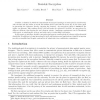Free Online Productivity Tools
i2Speak
i2Symbol
i2OCR
iTex2Img
iWeb2Print
iWeb2Shot
i2Type
iPdf2Split
iPdf2Merge
i2Bopomofo
i2Arabic
i2Style
i2Image
i2PDF
iLatex2Rtf
Sci2ools
121
click to vote
CRYPTO
1997
Springer
1997
Springer
Deniable Encryption
Consider a situation in which the transmission of encrypted messages is intercepted by an adversary who can later ask the sender to reveal the random choices
and also the secret key, if one exists
used in generating the ciphertext, thereby exposing the cleartext. An encryption scheme is deniable if the sender can generate `fake random choices' that will make the ciphertext `look like' an encryption of a di erent cleartext, thus keeping the real cleartext private. Analogous requirements can be formulated with respect to attacking the receiver and with respect to attacking both parties. In this paper we introduce deniable encryption and propose constructions of schemes with polynomial deniability. In additionto being interesting by itself, and having several applications, deniable encryption provides a simpli ed and elegant construction of adaptively secure multiparty computation.
Related Content
| Added | 07 Aug 2010 |
| Updated | 07 Aug 2010 |
| Type | Conference |
| Year | 1997 |
| Where | CRYPTO |
| Authors | Ran Canetti, Cynthia Dwork, Moni Naor, Rafail Ostrovsky |
Comments (0)

